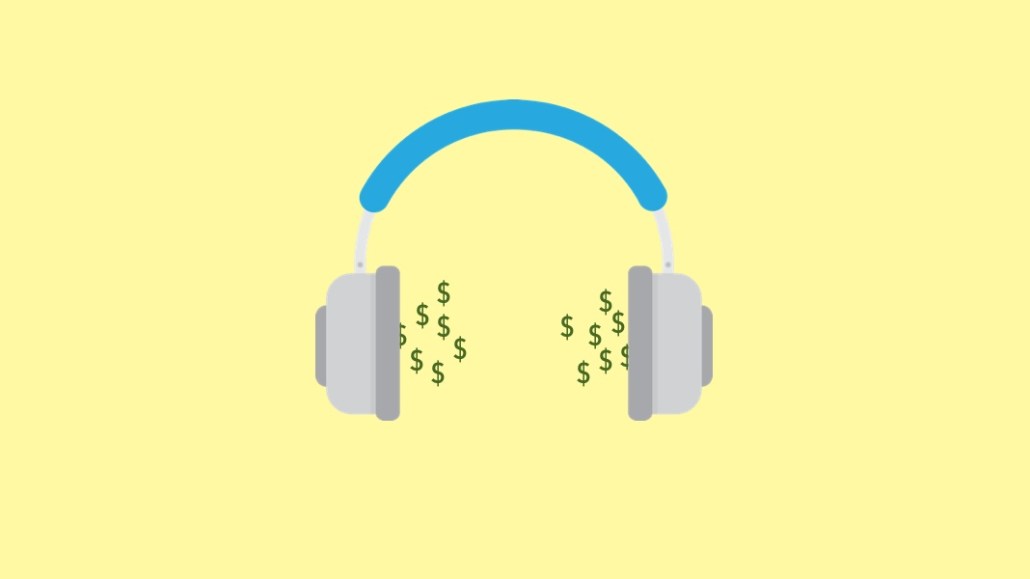Secure your place at the Digiday Media Buying Summit in Nashville, March 2-4

The right price for a podcast subscription has always been a bit of a question mark. The industry’s creators are about to get lots of opportunities to figure it out.
Apple CEO Tim Cook announced on Tuesday, April 20, that creators will soon be able to monetize their listeners directly by selling subscriptions within Apple Podcasts instead of serving them ads.
The key details:
- Creators have to join something called the Apple Podcasters Program to sell subscriptions through Apple Podcasts. There are no eligibility requirements to join, but membership costs $19.99 per year.
- Creators keep 70% of their subscription revenue, minus applicable taxes, for the first year. After a full year of paid service, their net revenue from subscriptions increases to 85%, again minus applicable taxes.
- The subscriber content, whether it’s bonus episodes or ad-free shows, does not need to be exclusive to Apple, but it cannot be available for free on any platform.
- Creators can basically charge whatever they like — Apple has set a price floor of 49 cents per month.
- The subscriptions feature, as well as the new look and feel of Apple Podcasts, will be rolled out in 170 countries and regions next month. Creators can use Apple’s back-end analytics platform, Apple Podcasts Connect, to begin adding the new assets needed to make their pages and shows look nice.
A platform for purchase, not a platform purchase
Podcasting’s pivot toward subscription revenue first began picking up steam about two years ago, thanks to the launch of subscriber-only podcast platform Luminary and services such as Supporting Cast, which made it easier for publishers to deliver subscriber-exclusive podcast content to customers.
But to date, most of the platforms’ moves in this direction have focused on a kind of platform-level purchase: People who wanted to listen to Spotify’s growing library of exclusive podcasts, for example, had to become Spotify subscribers; the only way to access one of Luminary’s shows was to pay $4.99 a month and subscribe to all of them.
Apple’s move turns that dynamic on its ear. Creators can essentially charge whatever they like for their Apple Podcasts subscriptions, and the range of price points among launch partners is already wide. QCODE, the podcast company behind shows including the Rami Malek-starring “Blackout,” announced it would sell subscriptions to QCODE+ for $2.99 per month; The Athletic, which made podcasts its first foray into ad-supported content, will offer two channels, each for $0.99 per month; Tenderfoot, the podcast production studio behind “Up and Vanished” and “Monster,” will charge $4.99 per month for Tenderfoot+.
Those new offerings join a small, but growing list of paid podcasts already out there, many of which aren’t cheap. For example, Nate Duncan and Danny Leroux, a pair of podcasters who produce a show about basketball called “Duncd On,” charge up to $16 per month for one of their podcasts.
“What the market will bear is, honestly, going to be a bit experimental,” said Dennis Kooker, the president of global digital business and U.S. sales at Sony Music Entertainment. “There’s not a track record.”
Sound clash
After years on the fringes of digital media, digital audio has blasted into the center of the industry’s conversations. Just a few months after live audio platform Clubhouse captured the attention of Silicon Valley and media watchers, Spotify, Reddit and Facebook have all announced plans to either launch or acquire live streaming audio capabilities.
The medium’s on-demand side has been busy too. Google announced earlier this month that its podcast app, Google Podcasts, has been downloaded 100 million times, less than six months after cracking 50 million downloads. And Spotify, after years of lagging behind Apple, is expected to nudge past Apple as a top source of podcast consumption. eMarketer projects that Apple’s market share in the podcasting space will drop to 24% in 2021.
More in Media

WTF is a creator capital market?
What is a creator capital market, what does it mean for creators looking to diversify revenue, and why is it so closely tied to crypto?

Media Briefing: Publishers explore selling AI visibility know-how to brands
Publishers are seeing an opportunity to sell their AI citation playbooks as a product to brand clients, to monetize their GEO insights.

Creators eye Snapchat as a reliable income alternative to TikTok and YouTube
Figuring out the Snapchat formula has been very lucrative for creators looking for more consistent revenue on a less-saturated platform.








